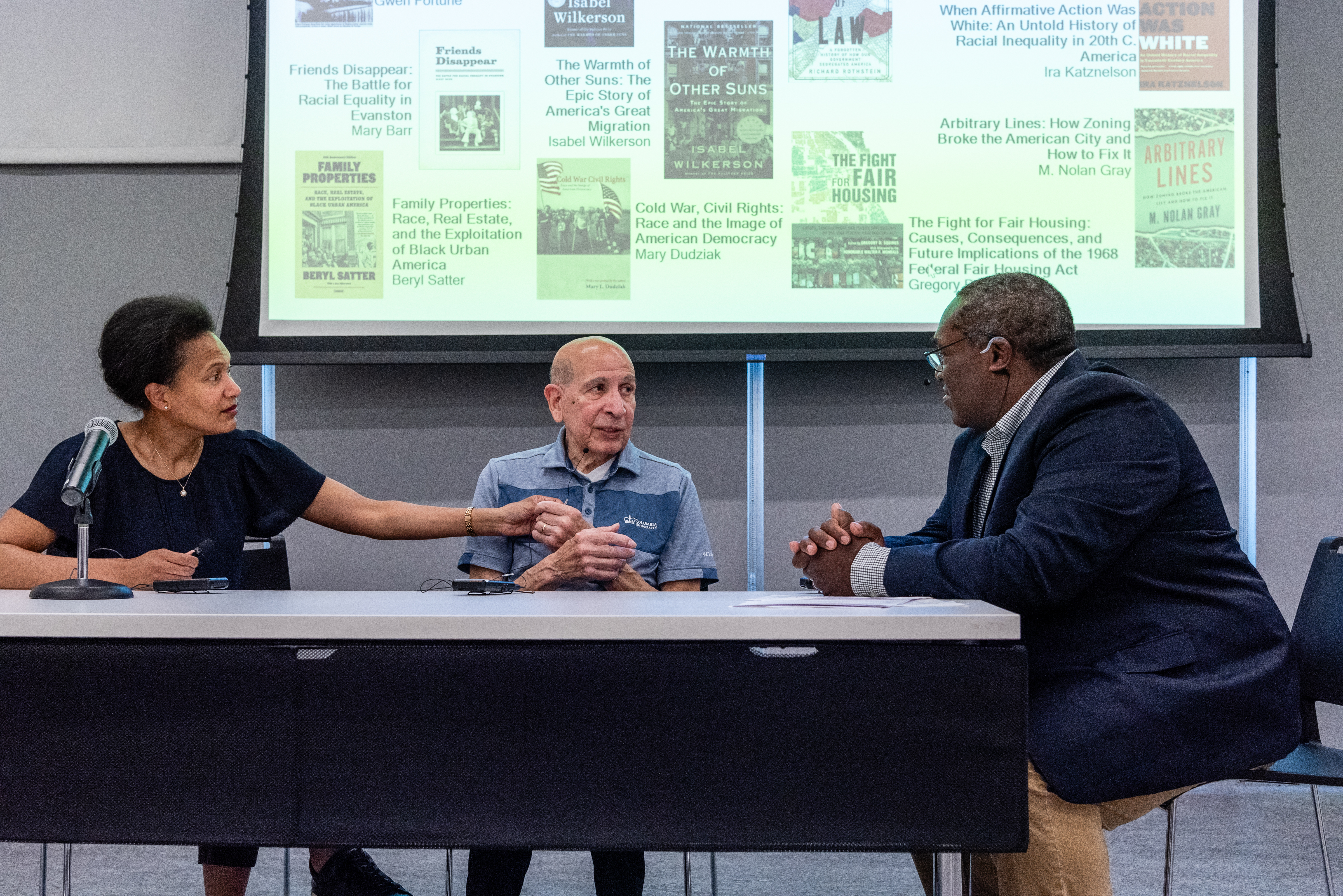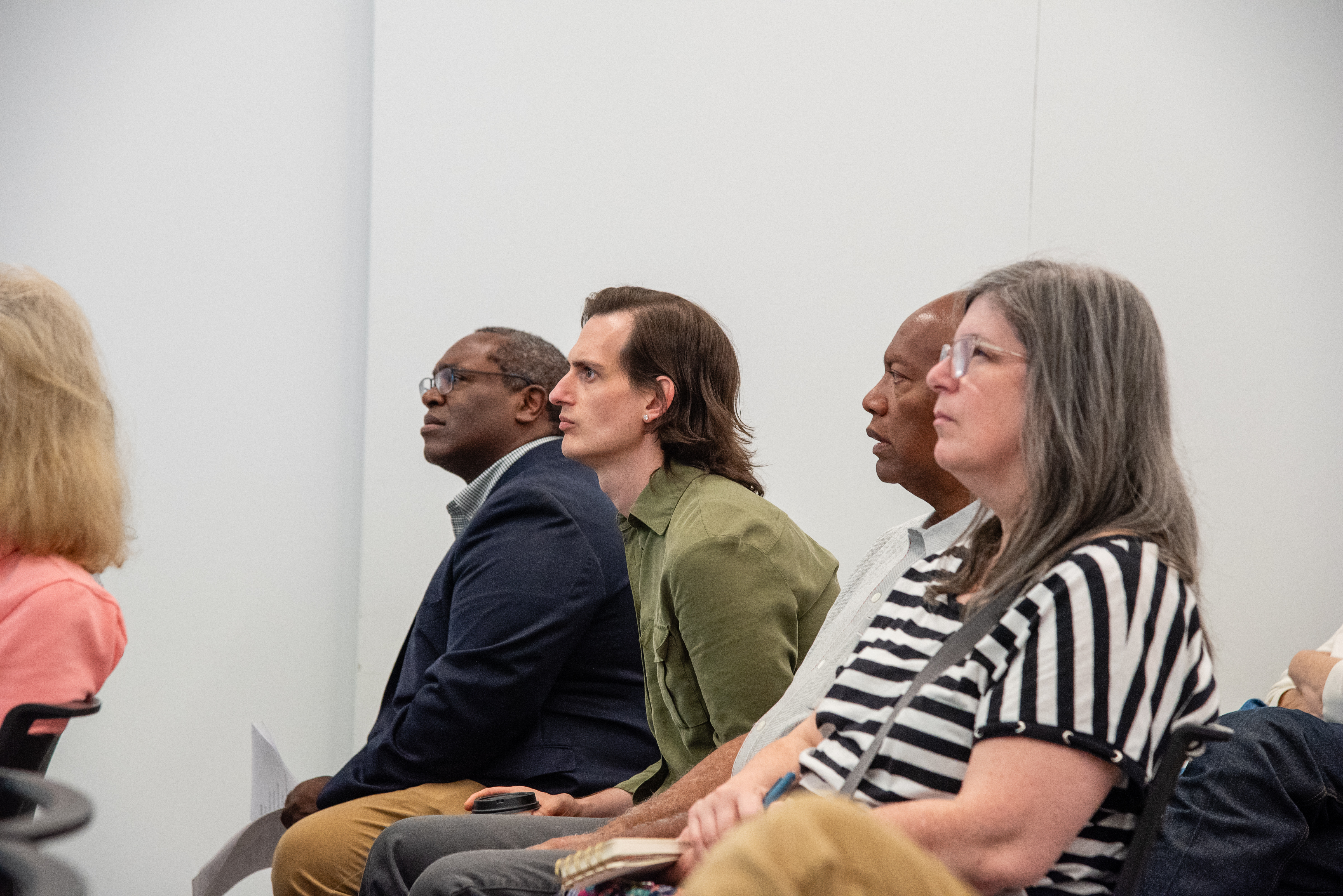Reflecting on Fair Housing in Skokie
September 12, 2024

On Tuesday, June 11, the library offered a panel presentation called Fair Housing in Skokie: Past and Present. Panelists shared their experiences related to fair housing in the Skokie community. Attendees have shared how powerful they found the presentation. We asked three library staff members who were part of the panel's creation and attended the event to share some of their reflections.
How did this event come about?
Nancy Kim Phillips, director of community engagement: When I first went through the online exhibit Fair Housing in Skokie, 1961-1971, I was taken aback by it all—the primary documents there, the story. I felt like more people needed to know about the story. Then I learned the library would be putting up a physical exhibit based on the online exhibit. I worked with different partners, including the Human Relations Commission, to develop an event that would focus on first-person stories.
Melody Sok, community engagement liaison: Because the Human Relations Commission was formed when Black homeowners were moving into and living in Skokie, I worked with the library’s digital collections librarian, Jessica Goodman. We looked for residents who are still in Skokie from that time—a lot of them are in their 90s. Nancy and I had informal conversations with original Black homeowners like David Jones, Becky Betts, Leona Davis, and Roger Fortune. Roger's mother, Gwen Fortune, has a manuscript that is part of our online exhibit. We didn’t know if they would want to rehash their experiences again or if they were at a point where they wanted to share. But everyone was super interested.
How did the panel work, and who were the panelists?
Melody Sok: We structured the presentation so people could learn a bit about the history of Skokie and make it relevant to what is happening today. We wanted to connect what has changed with what we thought had changed but has not. We also wanted to provide a chance to listen to people and their stories.
Nancy Kim Phillips: David Donegan, a member of the Human Relations Commission and a trained facilitator, led the panel. Emily England, curator at the Skokie Heritage Museum, spoke about the local history aspect. David Jones and his daughter, Becky Betts, shared their experiences being among the first Black homeowners in Skokie. Alex Chaparro, a member of the Human Relations Commission, is a realtor who knows a lot about how fair housing interacts with the home buying process now. He spoke from his professional experience. Dominic Voz from Open Communities, a nonprofit organization that investigates fair housing practices in our area, spoke about current fair housing issues.
Amy Holcomb, learning experiences manager: There was a real flow to the presentation.
Nancy Kim Phillips: The panelists and partners came together to offer different perspectives. After the panelists spoke, we provided an opportunity for people to talk about what they had heard, to debrief, and to tell their own stories if they wished to.

How did everyone connect with the shared stories?
Amy Holcomb: I was observing how attendees were engaging with the content. They were also engaging with each other in small group discussions. Everyone was very drawn to David Jones’s story, and the Open Communities presentation really stuck with people who explicitly came to the event wanting to learn more and know what they could do personally. Others were reflecting; a former Human Relations Commission member was thinking about how his earlier work on the commission has affected Skokie today. People were absorbing the personal stories and putting them into context, like Alex, a realtor who has worked with the National Association of Realtors.
Nancy Kim Phillips: I was surprised the most by Alex’s presentation. He had a personal story that built on the Jones's story and his own experience with housing discrimination. He shared his story and then how he took that personal experience as his own mission to help other people live in the homes that they want to. His perspective was included in the Chicago Tribune article about the event. He noted that current housing discrimination is much more subtle.
Melody Sok: The Joneses and their story really resonated with a lot of people.
Nancy Kim Phillips: Mr. Jones's grandson was in attendance with his mother. I asked the grandson if he knew all of his grandfather's history. He said he knew some, but not all of these details. What was really interesting to him was the Skokie Heritage Museum's presentation on the history of integration starting with the Great Migration, and how his family story fit into this great big history. The people made the presentation. You could tell as the speakers went from one to the next, they saw themselves as part of the overall picture and would carry on from there. Even Open Communities spoke from a systems and policy level, deferring to what the realtor and the Joneses said, and the history. All these different perspectives on this one topic, from the personal to the systems level and the history, fit together.
Additional resources:
- Fair Housing in Skokie, 1961-1971 online exhibit
- The Skokie Heritage Museum’s presentation slides
- Just Housing Amendment in Cook County, referenced by Open Communities
- Affirmatively Furthering Fair Housing, referenced by Open Communities
- Booklist